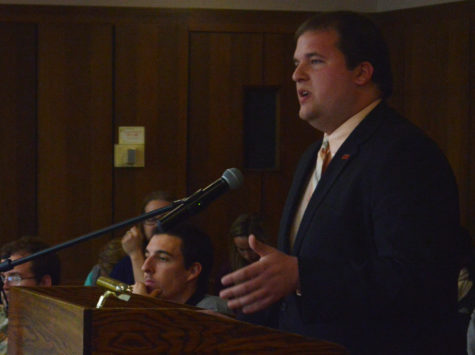Prototypes for bike-share program funded
January 22, 2014
By a vote of 18-11-1 a bill to fund prototypes for the bike share program passed. A 300 level industrial design class will be given more than $15,000 to fund materials to create the prototypes of the bikes and the rack.
GSB will contribute $5,095 while university administration will contribute $10,087.
Sen. Zach Bauer expressed concerns with spending money on a bill and ultimately on a program he did not feel a majority of students at Iowa State would utilize.
A survey conducted by the University Affairs committee showed that 32 percent of students who participated in the survey would utilize a bike-share program while 37 percent said they would not and another 30 percent said they might.
36 percent of individuals said they would not participate in a bike-share system while another 12 percent said they would not be willing to pay for a bike-share system.
Sen. Barry Snell said it is not important whether a numerical majority exists or not.
“They’re aren’t many things that we do here that effect 10,000 people,” Snell said.
Concerns were expressed by some about creating the prototypes before the research is done to determine if the program is needed. That research is expected to take place in an industrial design class in the fall of 2014.
Sarah Parkinson, senior in industrial design and a member of the design team said students would be more excited to use the program once they see the prototypes.
“Having a physical model there, you’re going to get more participation from the Iowa State students,” Parkinson said.
Sen. Krista Johnson expressed concerns that money would be spent, but future senates and university administration would not be interested in continuing the program.
President Spencer Hughes said the project is unusual because it spans over multiple years. He also addressed concerns about not knowing all the details of the project since it is more long-term than what GSB is accustomed to.
“If we want to do something that’s longer term, longer scope so to speak, further out on the horizon, which is what this project is. You’re going to have to start thinking a little bit differently about the type of information you need in order to make a decision,” Hughes said.
Sen. Khayree Fitten expressed concerns about the project coming out of the capital projects fund, since not all the products being funded will have a useful life for all students of the university.
Fitten said the University of Oregon implemented a similar system the cost around $200,000 and provided around 40 bikes.
Vice President Hillary Kletscher was unable to say in an interview on Jan. 21 whether or not the cost would be cheaper utilizing the industrial design department opposed to utilizing a private company.
Mark Kargol, a teaching assistant for the class that will be making the prototypes said he is confident the system would be published in several magazines if implemented with the help of industrial design students.










